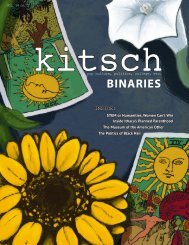Kitsch Magazine: Fall 2015
Binaries
Binaries
- No tags were found...
You also want an ePaper? Increase the reach of your titles
YUMPU automatically turns print PDFs into web optimized ePapers that Google loves.
GOING CLUBBING<br />
why we compulsively join clubs in college<br />
by Melvin Li<br />
During the 2014-<strong>2015</strong> academic year there were over<br />
a thousand student organizations at this university—almost<br />
one club for every kid at my high school. Download the 25-<br />
page Orgsync PDF and count them if you like. These clubs<br />
include the Film Club, the Adult Film Club, the Surf Club, Take<br />
Back the Tap, the Teszia Belly Dance Troupe, the Pokemon<br />
League, and societies for a host of different countries around<br />
the world (except for Kyrgyzstan). Walk-on clubs like Rainy<br />
Day are always happy to take in new members at any time,<br />
while more competitive clubs such as the Whistling Shrimp,<br />
Cornell Bhangra, and Yamatai actively encourage all who are<br />
interested to come to their auditions. And to the great relief<br />
of our parents, mentors, club recruiters, and even ourselves,<br />
many of us here at Cornell eventually find our paths in the<br />
organizations we join.<br />
Stepping onto Cornell’s campus for the first time, my<br />
biggest concerns were being away from home and not being<br />
able to make friends among the 3,222 other freshmen who<br />
enrolled that fall as the class of 2017. I was sure I would end<br />
up spending the whole year hiding in my room. Instead, as I<br />
walked around campus the following day, I was quite literally<br />
swept into the Big Red Marching Band, one of the first Cornell<br />
student organizations to begin recruiting in the fall. To make a<br />
long story short, I spent the remainder of freshman year going<br />
to class and going to band, where most of my friends were, and<br />
that was perfectly alright with me.<br />
The Bank of Mom and Dad, however, wasn’t as pleased<br />
with my progress. That summer, I was fed a double cocktail<br />
of advice that countless knowledgeable adults tell college<br />
students every year: “You need to be more active on campus”<br />
and “You need to network and form connections.” As an English<br />
major I had to get to know other English majors and people who<br />
shared my interest in writing, and I figured the easiest way to do<br />
that was to join writing clubs on campus. So come sophomore<br />
year I pulled a stunt common among students who had never<br />
been to Club Fest before. I headed down to Barton Hall and<br />
signed up for three clubs that fit my interests: The Cornell Daily<br />
Sun (The Princeton Review’s favorite college newspaper), Rainy<br />
Day (Cornell’s undergraduate literary magazine), and of course<br />
the lovely little magazine you’re reading right now. I knew I<br />
was wading into a lot of commitments, but I wanted to devote<br />
a lot of my free time to extracurriculars after having almost<br />
none freshman year.<br />
What I did not expect was that I would end up<br />
spending most or almost all of my free time with clubs and the<br />
people in them. Now in my case this might be because I suck<br />
at time management, but many college students who devote<br />
themselves to extracurriculars do so for reasons ranging from<br />
passion about the club’s function, to a desire to spend time<br />
with the people in their clubs or pad their resumes. Don’t get<br />
me wrong—I love parading around at football games, covering<br />
events on campus, reading literary submissions, and writing<br />
articles like these. But I, like all students here, also have classes,<br />
exams, papers, and other important things that I’m supposed to<br />
worry about. My parents sent me to Cornell first and foremost<br />
to get an education, and so for me tomorrow’s classes take<br />
priority over today’s clubs. But getting a good education and<br />
dedicating oneself to clubs don’t have to be mutually exclusive.<br />
With their most immediate goals fulfilled (attending<br />
stimulating classes at an elite university on their way to a<br />
lucrative job), students would be expected to attend fewer<br />
clubs after getting into college, but actually the opposite has<br />
been observed. Students at Cornell and most universities in<br />
the United States participate in many times more student<br />
organizations than the typical high school student. So what<br />
about extracurricular activities keeps students involved<br />
17




